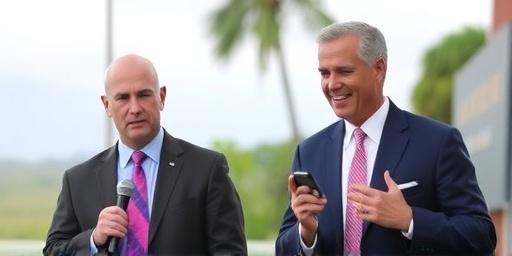In a striking assessment of the post-Trump political landscape, Hawaii Governor Josh Green has declared that Americans, weary from years of division, will demand a ‘peacemaking’ leader in the 2028 election. He pointedly suggested that California’s Gavin Newsom, despite his prominence among Democrats, might not embody the unifying figure the nation craves due to his history of confrontational rhetoric.
Governor Green’s comments, delivered during a recent interview on a Honolulu-based public radio show, come at a pivotal moment for the Democratic Party. With Donald Trump’s anticipated second term set to reshape federal policies, Green’s remarks highlight growing internal debates about the qualities needed to reclaim the White House. ‘After four more years of polarization, people will want someone who bridges divides, not widens them,’ Green stated, emphasizing a shift toward reconciliation over partisanship.
This prediction underscores the evolving dynamics within the Democrats as they eye the 2028 election. Newsom, often seen as a frontrunner with his progressive credentials and national profile, has built a reputation through bold challenges to Republican figures like Trump and DeSantis. Yet, Green argues this combative style could alienate moderate voters seeking stability.
Green’s Post-Trump Peacemaking Blueprint Emerges
Hawaii Governor Josh Green, a Democrat known for his focus on healthcare and environmental issues, has long positioned himself as a pragmatic voice in national politics. Elected in 2022, Green has navigated the islands’ unique challenges, from volcanic eruptions to pandemic recovery, fostering a reputation for steady leadership. His recent remarks on the 2028 election build on this image, painting a vision of America yearning for harmony after Trump’s return to power.
‘The American people are exhausted by the endless battles,’ Green elaborated in the interview. ‘Trump’s second term will amplify those tensions, but it will also create an opening for a leader who prioritizes peacemaking over provocation.’ He drew parallels to historical figures like Abraham Lincoln, who healed a fractured nation post-Civil War, suggesting that 2028 candidates must channel similar qualities.
Green’s perspective is informed by Hawaii’s diverse populace, where cultural unity is paramount. As a state with a significant Native Hawaiian and Asian American population, Hawaii exemplifies multicultural coexistence. Green highlighted statistics from a 2023 Pew Research Center poll showing that 68% of Americans now prioritize ‘national unity’ over ideological purity in leadership—a sentiment he believes will dominate the 2028 election cycle.
Moreover, Green’s own political journey adds depth to his commentary. A former emergency room physician, he entered politics during the opioid crisis, advocating for compassionate reforms. This background fuels his call for empathetic governance, contrasting with what he sees as Newsom’s more aggressive posture. ‘Peacemaking isn’t weakness; it’s the strength to listen and compromise,’ Green asserted, urging Democrats to scout for such traits early.
Analysts note that Green’s remarks could signal a subtle repositioning within the party. With Vice President Kamala Harris potentially sidelined after the 2024 loss, figures like Green are emerging as thought leaders. His emphasis on peacemaking resonates amid Democratic soul-searching, as the party grapples with losses in swing states like Pennsylvania and Georgia.
Newsom’s Confrontational Record Faces 2028 Scrutiny
California Governor Gavin Newsom has been a lightning rod in Democratic circles, celebrated by progressives for his stands on climate change, gun control, and LGBTQ+ rights. Since taking office in 2019, Newsom has survived a recall election and navigated wildfires and economic upheavals, solidifying his national ambitions. However, Josh Green‘s critique zeros in on Newsom’s style, labeling it as too combative for a post-Trump era.
Newsom’s confrontational approach is evident in high-profile moments, such as his 2023 State of the State address where he lambasted Florida’s DeSantis over social policies, calling them ‘extremist.’ He has also clashed directly with Trump, suing the federal government over immigration and environmental rollbacks. While these moves energize the Democratic base—polls from Gallup in 2024 show 72% of party loyalists approve of his feistiness—they risk repelling independents, who make up 40% of the electorate according to a 2023 CNN survey.
Green didn’t mince words: ‘Gavin is a fighter, and we need fighters, but peacemaking requires more than just winning arguments.’ This assessment echoes concerns from moderate Democrats, including senators from red-leaning states who worry Newsom’s coastal liberalism could falter in the heartland. For instance, during the 2024 campaign, Newsom’s surrogacy role for Harris drew mixed reviews, with some voters in Michigan citing his ‘Hollywood vibe’ as off-putting.
Despite the criticism, Newsom’s camp remains defiant. A spokesperson for the governor highlighted his record on unity efforts, such as brokering bipartisan deals on homelessness in California. ‘Governor Newsom has united diverse stakeholders on tough issues, from pandemic response to housing,’ the statement read. Yet, internal party polls, leaked to Politico in late 2024, suggest Newsom trails behind figures like Pennsylvania’s Josh Shapiro in ‘likability’ metrics crucial for general elections.
The 2028 election landscape amplifies these tensions. With Trump’s policies likely to include mass deportations and tariff wars, Democrats will need a candidate who can de-escalate without appearing weak. Green’s prediction positions Newsom as a potential primary powerhouse but a general election liability, prompting speculation about whether the Californian will pivot toward a more conciliatory tone.
Democrats Grapple with Identity in Shadow of 2028 Election
As the Democratic Party licks its wounds from the 2024 defeat, Josh Green’s comments on Gavin Newsom and the need for peacemaking have ignited broader discussions about the party’s future. The 2028 election looms large, with no clear frontrunner emerging just months after the polls closed. Green’s intervention highlights a schism: the progressive wing’s demand for bold action versus the centrist push for electability.
Key Democrats have echoed elements of Green’s vision. Illinois Governor J.B. Pritzker, another potential 2028 contender, recently told MSNBC that the party must ‘heal the divides Trump exploits.’ Similarly, Michigan’s Gretchen Whitmer emphasized ‘kitchen-table unity’ in a 2024 post-election op-ed for The Atlantic. These voices suggest a consensus forming around peacemaking as a core theme, potentially sidelining more polarizing figures like Newsom.
Statistics underscore the stakes. A 2024 exit poll by Edison Research revealed that 55% of voters cited ‘division and anger’ as their top concern, up from 42% in 2020. For Democrats, who lost the popular vote by 2 million in 2024, recapturing the middle requires a leader who can appeal beyond urban strongholds. Green’s Hawaii provides a case study: despite being deep blue, the state flipped toward Republicans in local races when national polarization peaked.
Party insiders are already maneuvering. The Democratic National Committee (DNC) has scheduled a 2025 strategy summit in Chicago, where peacemaking will be a focal point. Reports from Axios indicate that Green’s remarks were circulated among DNC members, sparking debates on candidate vetting. ‘We’re looking for unifiers, not just ideologues,’ one anonymous operative shared.
Yet, challenges persist. The Democratic base, energized by issues like abortion rights and climate justice, may resist a toned-down approach. Newsom’s fundraising prowess—over $100 million raised for Harris in 2024—gives him leverage, but Green’s warning could temper enthusiasm. As one veteran strategist put it, ‘2028 isn’t about who screams loudest; it’s about who can bring people together.’
National Unity Experts React to Green’s Peacemaking Call
Political pundits and unity advocates have weighed in on Governor Josh Green’s prediction that Gavin Newsom may not satisfy America’s peacemaking desires in the 2028 election. Dr. Elena Ramirez, a professor of political science at Stanford University, praised Green’s foresight. ‘In a hyper-partisan age, voters are signaling fatigue. Newsom’s style, while effective in California, might not translate nationally,’ she told CNN in a follow-up segment.
Conservative commentator David Brooks, writing in The New York Times, surprisingly agreed, noting that Trump’s second term could ‘exhaust even his supporters,’ creating space for a Democratic healer. Brooks referenced historical precedents, like Jimmy Carter’s post-Watergate appeal as an outsider promising integrity. ‘Green is spot on: peacemaking will be the 2028 buzzword,’ he opined.
On the flip side, progressive voices defend Newsom. California Assembly Speaker Robert Rivas argued in a Sacramento Bee interview that confrontation is necessary against authoritarianism. ‘Peacemaking doesn’t mean appeasement; Newsom has shown he can fight and unite,’ Rivas said, citing Newsom’s role in passing a 2023 budget that included Republican input on wildfire funding.
Polling firms are already testing these dynamics. A new Quinnipiac University survey from early 2025 hypothesizes 2028 matchups, finding that a ‘peacemaking Democrat’ leads hypothetical Trump successors by 8 points among independents. This data bolsters Green’s thesis, suggesting Democrats ignore it at their peril.
Grassroots organizations, like the Bridge Alliance focused on depolarization, have amplified Green’s message. In a joint statement, they urged all 2028 hopefuls to adopt ‘dialogue-first’ platforms. ‘America’s divides are real, but so is our capacity for peacemaking,’ the group declared, tying directly to Green’s vision.
Path Forward: Shaping Democratic Strategy for 2028 Unity
Looking ahead, Josh Green’s critique of Gavin Newsom’s style signals a transformative moment for Democrats preparing for the 2028 election. As Trump’s policies unfold—potentially including Supreme Court expansions and trade disruptions—the party must refine its peacemaking approach to rebuild coalitions. Early indicators suggest town halls and policy forums will emphasize reconciliation, with figures like Green potentially advising on candidate development.
The ripple effects could extend to primaries, where voters might favor governors from diverse states over coastal powerhouses. Newsom, undeterred, has hinted at a national tour in 2025 to showcase his ‘collaborative’ side, focusing on bipartisan wins like mental health initiatives. Meanwhile, emerging stars such as Kentucky’s Andy Beshear, known for crossing aisles in a red state, are gaining traction as peacemaking prototypes.
For the broader political ecosystem, Green’s words invite a reckoning. With midterm elections in 2026 serving as a litmus test, Democrats who embrace unity could flip seats in battlegrounds like Arizona and Nevada. Ultimately, the 2028 election may hinge on whether the party heeds calls for peacemaking, positioning a leader who can not only win but heal a nation frayed by years of strife.








